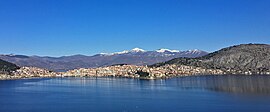Kastoria, Greece
|
Kastoria Καστοριά |
|
|---|---|

Kastoria and Lake Orestiada.
|
|
| Coordinates: 40°31′N 21°16′E / 40.517°N 21.267°ECoordinates: 40°31′N 21°16′E / 40.517°N 21.267°E | |
| Country | Greece |
| Administrative region | West Macedonia |
| Regional unit | Kastoria |
| Area | |
| • Municipality | 763.3 km2 (294.7 sq mi) |
| • Municipal unit | 57.3 km2 (22.1 sq mi) |
| Elevation | 700 m (2,300 ft) |
| Population (2011) | |
| • Municipality | 35,874 |
| • Municipality density | 47/km2 (120/sq mi) |
| • Municipal unit | 16,958 |
| • Municipal unit density | 300/km2 (770/sq mi) |
| Time zone | EET (UTC+2) |
| • Summer (DST) | EEST (UTC+3) |
| Postal code | 521 00 |
| Area code(s) | 24670 |
| Vehicle registration | KT |
Kastoria (Greek: Καστοριά, Kastoriá [kastoˈrʝa]) is a city in northern Greece in the region of West Macedonia. It is the capital of Kastoria regional unit. It is situated on a promontory on the western shore of Lake Orestiada, in a valley surrounded by limestone mountains. The town is known for its many Byzantine churches, Byzantine and Ottoman-era domestic architecture, fur clothing industry, and trout.
The name "Kastoria" first appears in 550 AD, mentioned by Procopius as follows: "There was a certain city in Thessaly, Diocletianopolis by name, which had been prosperous in ancient times, but with the passage of time and the assaults of the barbarians it had been destroyed, and for a very long time it had been destitute of inhabitants; and a certain lake chances to be close by which was named Castoria. There is an island in the middle of the lake, for the most part surrounded by water; but there remains a single narrow approach to this island through the lake, not more than fifteen feet wide. And a very lofty mountain stands above the island, one half being covered by the lake while the remainder rests upon it." (Procopius "Περί κτισμάτων" /On buildings, book IV,1.3) Although Procopius refers to it as "a city of Thessaly", the description is undoubtedly that of Kastoria, a city on a promontory in a lake.
There are several theories about the origin of the name Kastoria. The dominant of these is that the name derives from the Greek word κάστορας (kástoras, meaning "beaver"). Trade in the animal's fur, sourced from nearby Lake Orestiada, has traditionally been an important element of the city's economy. Other theories propose that the name derives from the Greek word κάστρο (kástro, meaning "castle"; from the Latin word castra) or from the mythical hero Κάστωρ (Kástōr), who may have been honoured in the area. The word is sometimes written with a C, Castoria, especially in older works. From Greek, the name was borrowed into Turkish as Kesriye. The Serbian, Bulgarian and Slavic name of the city is Kostur (Cyrillic: Костур).
...
Wikipedia


